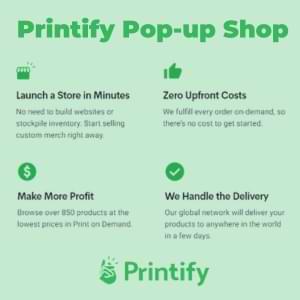Marketing is an essential component of any company’s success. Small businesses can reach their desired target audience and raise brand awareness with the right strategies and tactics.
However, knowing which strategies to use and how to properly implement them can be difficult. This article will provide examples of effective small business marketing strategies, ranging from social media marketing to referral programs, as well as advice on how to make the most of them. Small businesses can have a big impact and reach if they take the right approach.
In this article, we’ll cover a list of content marketing and digital marketing strategies that many small businesses can implement in a marketing plan to promote their business.
Small Business Marketing Strategies to Grow Your Local Business
Below are some examples of small business smart marketing strategies that you could use to grow your business.
Social media marketing: Engage with your target audience through various social media platforms such as Facebook, Instagram, Twitter, and LinkedIn. Make compelling content that your audience will appreciate, such as visually appealing images, videos, and informative posts. Encourage interaction and conversation by promptly responding to comments and messages. Use the targeted advertising options available on these platforms to reach specific demographics and broaden the reach of your brand.
Develop a content strategy that includes creating and distributing high-quality content across multiple channels. This can include creating informative videos or podcasts, designing visually appealing infographics, or publishing eBooks on your website. Focus on providing value to your target audience by addressing their pain points, answering their questions, and providing industry insights. This will help establish your company as a reliable source of information and will contribute to brand loyalty.
Build an email list by providing valuable incentives such as exclusive content, discounts, or free resources. Send regular newsletters or promotional emails to your subscribers using email marketing platforms. Personalize your emails in accordance with their preferences and previous interactions with your company. Provide information on your most recent products, special offers, or upcoming events. Consider segmenting your email list in order to send more targeted and relevant content to specific segments of your audience.
Search engine optimization (SEO): Improve the visibility of your website in search engine results. Perform keyword research to determine the terms and phrases that your target audience is looking for. Incorporate these keywords naturally into the content, meta tags, and headings of your website. Create a user-friendly website that is fast to load, mobile-responsive, and offers a seamless browsing experience. Concentrate on creating valuable and engaging content that will attract backlinks from other reputable websites, which will help your search engine rankings.
Influencer marketing: Find influencers or key individuals in your industry who have a large following and engage with them. Contact them if you want to work together on promotional campaigns, sponsored content, or product reviews. The endorsement of an influencer can help increase brand awareness and credibility among their followers. To maintain authenticity and maximize the impact of the collaboration, make sure the influencer’s values align with yours.
Referral programs: Set up a referral program to encourage your current customers to recommend your company to their friends and family. For successful referrals, provide incentives such as discounts, rewards, or exclusive access to new products. Provide a streamlined referral process that allows customers to easily participate in and track their referrals. To ensure proper tracking and reward distribution, consider creating referral codes or personalized links that customers can share with others.
Local collaborations: Look for other businesses in your community that complement your products or services. Form alliances with them to promote each other’s products. Co-hosting events, sharing marketing materials, or featuring each other on your websites or social media platforms can all be part of this. You can broaden your reach within the local community and reach new audiences by leveraging each other’s customer bases.
Customer testimonials and reviews: Encourage your satisfied customers to leave reviews and testimonials about their interactions with your company. These reviews should be prominently displayed on your website, social media pages, and relevant review platforms. Positive reviews increase trust and credibility among potential customers by serving as social proof of the quality of your product or service. Respond to both positive and negative reviews in a professional and timely manner to demonstrate your dedication to customer satisfaction.
Community involvement: Get involved in your community by attending events, sponsoring local initiatives, or donating to worthy causes. This involvement increases brand visibility, strengthens relationships with the community, and demonstrates your commitment to making a positive difference. Consider volunteering, hosting workshops or seminars, or organizing charity events that correspond to your company’s values. This participation gives you the opportunity to interact directly with potential customers and build a positive brand image. It also provides opportunities for local media coverage, which increases your visibility in the community.
Offer exclusive promotions: Create limited-time offers, discounts, or giveaways to generate excitement and encourage immediate purchases. These special offers can be extended to your current customer base or targeted to a specific segment of your audience. Promote these offers through various channels, such as social media, email marketing, or your website. Consider collaborating with other businesses to develop joint promotions that will attract a larger customer base and benefit both parties.
Customer loyalty programs: Create a loyalty program to reward and retain current customers. Incentives such as exclusive discounts, early access to new products, or loyalty points that can be redeemed for rewards are all good ideas. This not only encourages repeat purchases, but it also fosters appreciation and loyalty among your customer base. Utilize technology to effectively track and manage the loyalty program, ensuring seamless customer experiences.
Targeted advertising: Use digital advertising platforms like Google Ads or social media advertising to reach out to specific demographics or audience segments. Make use of advanced targeting options such as location, interests, behavior, or demographics. Create compelling ad copy and visuals that will pique the interest of your target audience, resulting in higher click-through rates and conversions. Regularly monitor and optimize your advertising campaigns to maximize their effectiveness and return on investment.
Mobile marketing: Given the significant increase in mobile usage, optimize your marketing efforts for mobile devices. Make sure your website is mobile-responsive and offers a smooth browsing experience. Investigate mobile-specific advertising formats, such as in-app ads or mobile display ads, to effectively reach your target audience. Additionally, use mobile messaging platforms such as SMS marketing or chatbots to directly engage with customers and deliver personalized offers or updates.
Remember that it is critical to track and measure the results of these marketing strategies in order to determine their effectiveness. Analyze data on a regular basis, solicit customer feedback, and adjust your strategies accordingly. Marketing is a continuous process, and remaining agile allows you to stay ahead of the competition while also maintaining a strong connection with your target audience.
Finally, small businesses can use a variety of effective marketing strategies to reach their target audience and build their brand. From social media marketing to customer loyalty programs, the key is to identify and implement the right strategies. Furthermore, tracking and measuring the results of these strategies is critical to ensuring the best return on investment. Small businesses can have a big impact and reach if they take the right approach.
Frequently Asked Questions (FAQ)
Q: What are some of the best marketing strategies for small business examples?
A: Some of the best marketing strategies for small businesses include email marketing, online marketing, and search engine optimization (SEO). Additionally, leveraging local business partnerships and creating a strong presence on social media can also be effective.
Q: How can small businesses start marketing?
A: Small businesses can start marketing by creating a plan that outlines their goals, target audience, and budget. They can then use a combination of marketing channels such as social media, email marketing, and search engine optimization to promote their brand and products/services.
Q: What is content marketing and how can it benefit my small business?
A: Content marketing is a marketing strategy that focuses on creating and sharing valuable content that attracts and engages a target audience. Benefits of content marketing for small businesses can include increased brand awareness, improved SEO, and the ability to establish authority in your industry.
Q: How can small businesses optimize their online presence?
A: Small businesses can optimize their online presence by creating a website with a strong landing page, optimizing their Google My Business listing, and ensuring that all of their social media accounts are regularly updated with high-quality content.
Q: What is the importance of keyword research in small business marketing?
A: Conducting keyword research is important for small business marketing because it helps you identify the keywords and phrases potential customers are using to find your products or services. By incorporating these keywords into your website copy and marketing campaigns, you can increase your visibility on search engine results pages and attract more traffic to your site.
Q: What role does a marketing agency play in small business marketing?
A: A marketing agency can help small businesses develop and execute effective marketing campaigns by providing expertise in areas such as SEO, social media marketing, and email marketing. They can also help small businesses analyze their results and adjust their strategies accordingly.
Q: How can small businesses increase brand awareness on a limited budget?
A: Small businesses can increase brand awareness on a limited budget by using low-cost marketing tactics such as social media marketing, email marketing, and content marketing. They can also partner with other businesses to cross-promote each other’s products or services.
Q: What are some best practices for email marketing for small businesses?
A: Best practices for email marketing for small businesses include segmenting your email list, creating personalized content, and including a clear call-to-action in each email. It’s also important to regularly analyze your results and adjust your strategy accordingly.
Q: How can small businesses attract more customers with local SEO?
A: Small businesses can attract more customers with local SEO by optimizing their Google My Business listing, incorporating local keywords into their website copy, and generating positive reviews from existing customers.
Q: What are some effective marketing initiatives for small businesses in the digital age?
A: Some effective marketing initiatives for small businesses in the digital age include using social media to promote their brand and products/services, creating high-quality content to attract and engage their target audience, and using email marketing to keep in touch with existing customers.
Best Marketing Strategies for Small Business. This articles has examples of small business marketing strategies for your small biz to start today to grow your business bottom line! Share on X
Note: Some links on this page are affiliate links meaning that if you click on my link and make a purchase, I will receive a small commission. It does not however affect the price you pay. Plus, it’s a great way to support me and the content I’m providing.







